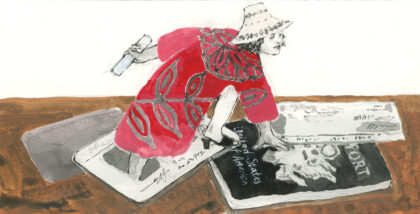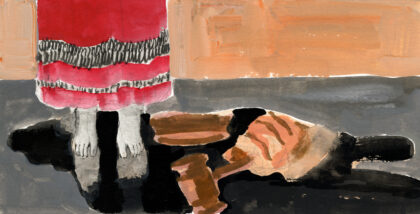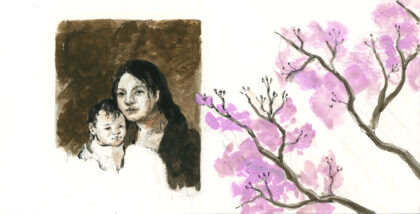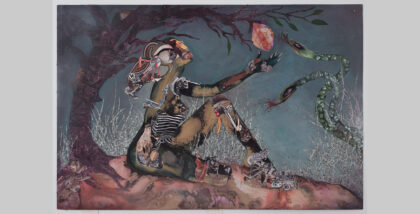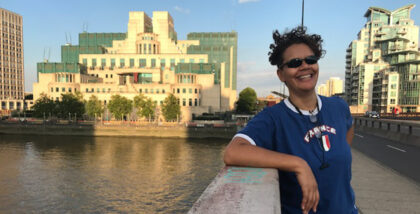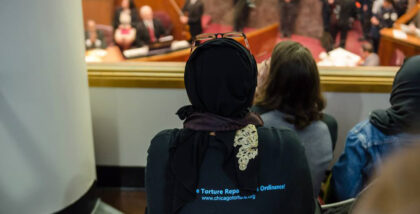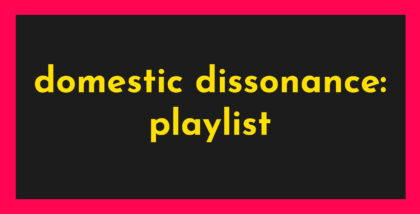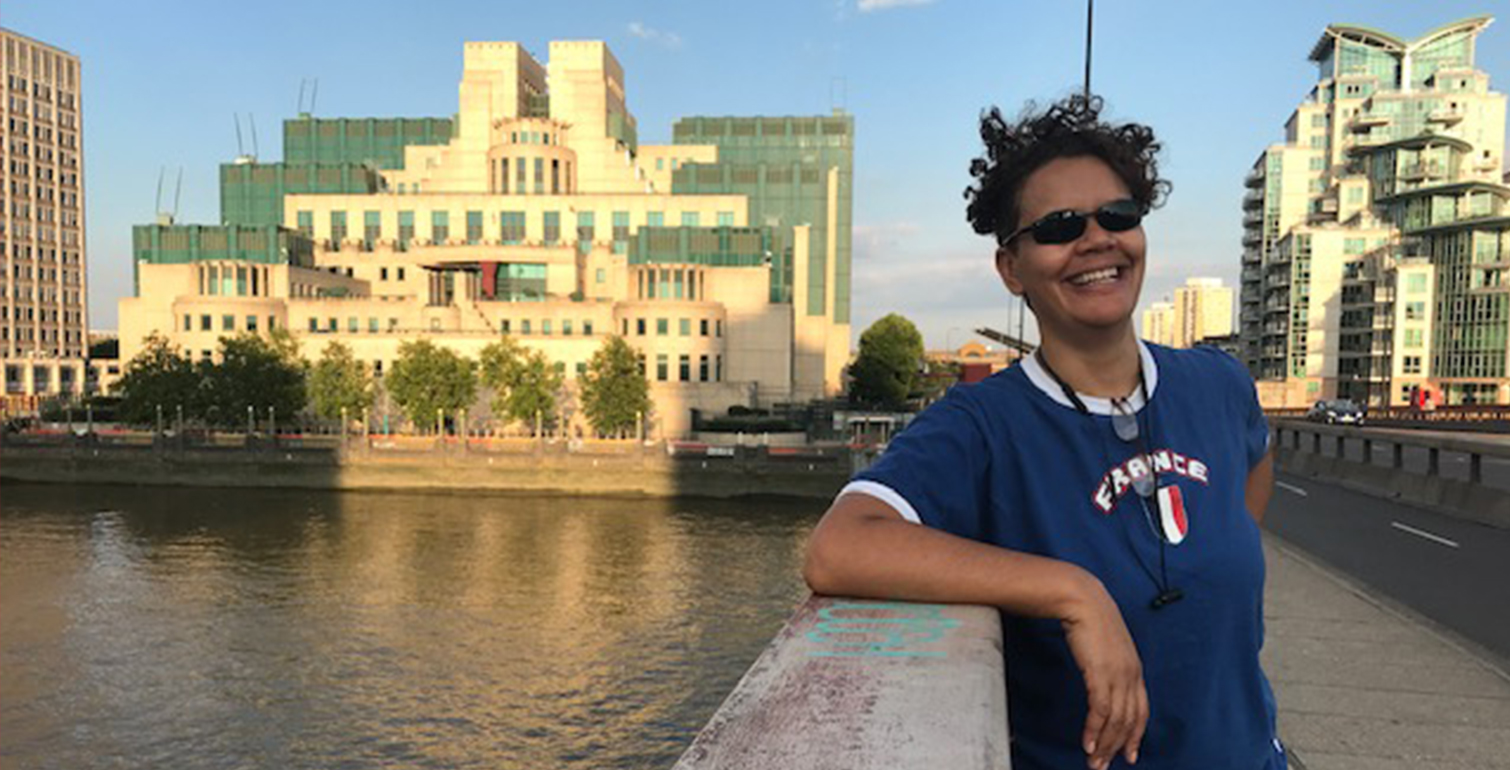 Image courtesy of Candace Rondeaux
Image courtesy of Candace Rondeaux
Candace Rondeaux’s trajectory seems to align uncannily with the major pivots of recent history. She learned Russian in the midst of the Cold War; found journalism with 9/11; became a policy analyst at the height of the US war in Afghanistan. But the transitions in Rondeaux’s career are also a testament to how she’s chosen to live: keenly engaged with the changing world around her, and also attuned to self-awareness. “There’s something about the idea of a calling, that voice that says, ‘over here, pay attention to this,’” she says of her shifts from literary translation to crime reporting to policy research. “It insists on itself.”
A former South Asia bureau chief for the Washington Post and senior analyst for the International Crisis Group, she is now a senior fellow with New America’s International Security program and a professor at the Center on the Future of War at Arizona State University. At the heart of her work—whether in activism, journalism, education, or international relations—is a commitment to probing gaps in our assumptions, holding power to account, and applying critical imagination to the future.
Raised and politicized in 1980s Chicago, where she was exposed early to the anti-Apartheid movement, she stresses the importance of firsthand experience in the realm of foreign policy-making. “If you have never tasted injustice in a very personal way,” she says, “it’s hard for you to understand how it might look when it’s presented as a policy in another country.”
Our conversation traversed the wide-ranging terrain of Rondeaux’s life, from protesting racism to covering extremism to her more recent work examining how proxy forces and flows of global capital are transforming twenty-first century warfare.
***
Meara Sharma: What sort of world did you inhabit as a kid? What stirred your interest in global issues?
Candace Rondeaux: It was the ’80s while I was at school in Chicago, and there were a few big influences. Apartheid was still enforced in South Africa, and it was front and center in a lot of discussions in the Black community. A few of my high school friends’ older siblings went to Northwestern, where there was a huge wave of activism—they were one of the first schools advocating to divest from South African gold and other businesses.
Another influence came from being involved in this end-of-Cold War magnet program in public schools targeted at growing the next generation of national security and foreign policy leaders. The idea was to introduce kids very early to hard foreign languages—Arabic, Japanese, Russian—and then inculcate them with social studies and cultural studies. The class I entered was Russian. It is one of those things that leaves a big mark on you. And when I went to undergrad, I became a Russian area studies major.
Meara Sharma: All because of that exposure to Russian a few years earlier?
Candace Rondeaux: Yeah, I started at the University of Wisconsin in 1988, and it was kind of a weird time. It was the end of the Cold War; the Wall hadn’t yet come down. People were still concerned with Russia as a potential threat. But on American campuses, there were a lot of race issues.
That year, this fraternity at my university decided to hold their annual pledge week event, which typically was in Greek togas, in blackface. A group of us went down there and protested. We went to the fraternity house and chained ourselves to the bench and had to be carried off by the police. It was very quiet, it was only eight of us, but it caused a big storm.
And it resulted in a lot of crazy stuff on campus, with wannabe Nazis sending out death threats in the mail, and by phone, and suddenly it just became this national event. CNN picked it up, a bunch of other news stations picked it up. It was pretty disruptive. So ultimately, about a year later, I dropped out.
Weirdly, I ended up working on the edges of the burgeoning protest movement across Europe. I was on the road—tramping, if you will. And I became involved with a group of people who were into that lifestyle, including folks who had set up squats all over Germany. I was in Hamburg around the time of the fall of the Berlin Wall.
We ultimately ended up in the UK during the Poll Tax Riots. And then a couple years later, all that business with Rodney King happened. Watching it unfold, I felt like I really need to be home again. This is pre-Internet, and during the LA riots, it really looked like war was going to go down. It looked like the 1960s were going to be recapitulated. I felt, as a person of color, like I should be there.
Meara Sharma: So eventually you went back to school and got your degree in Russian studies—the Russia thread sustained, even after all those years of traveling.
Candace Rondeaux: Yeah, I loved having a party trick. Like, “Surprise, I’m a Black girl and I speak Russian fluently.”
Meara Sharma: Then, after a stint as a Russian literary translator, I gather you switched gears and became a reporter?
Candace Rondeaux: I was tired of the whole literary publishing thing; I felt I was always going to be this low-level grunt. But I had actually worked with an author who had written about surviving the Soviet gulag, and that inspired me to go to NYU journalism school.
In September 2001, it just so happened that I had an internship with the New York Daily News and the New York Observer. And my second day on the job was 9/11. It was crazy.
Meara Sharma: Wow. A baptism by fire.
Candace Rondeaux: It was so surreal. The whole day was basically myself and the two other interns that actually made it to the office. Nobody else could get there. And they dispatched us to the nearest morgue in Queens—they thought there were going to be a lot of bodies. But there were no bodies, it turned out. And then from there, it just became trying to piece together—who was this Osama bin Laden guy, what’s Al-Qaeda?
Meara Sharma: So that set you on a course covering crime in New York (for the New York Daily News), Florida (for the St. Petersburg Times), and Virginia and Maryland (for the Washington Post). Eventually you became the Post’s South Asia bureau chief in Afghanistan and Pakistan. I’m curious about the transition from covering violence in the States, to turning to South Asia. Were there textural similarities to the work?
Candace Rondeaux: Oh absolutely. I mean, it’s the same. You’re always at the edge of somebody’s worst nightmare. You’re always finding people on their worst days. Be it the victims, or even the perpetrators.
It was both beautiful and terrifying. Beautiful, because I made so many good friends in both places, amongst the international correspondent core, international aid workers, diplomats, as well as Afghans and Pakistanis. The civil society who were trying to put things right… you couldn’t dream of creating a community like that, even if you tried.
And then the terrifying part was just the violence, the scale and sometimes the seeming randomness of it. Not just the bombings and the shootings, but more structural forms of violence.
I’d arrived about a month after Benazir Bhutto had been assassinated. In the year that I was there, we had Musharraf stepping down from power, we had two elections, we had the Mumbai attacks, the attacks on the Indian Embassy in Kabul… I really struggle to understand how one person was supposed to cover these two countries that were just exploding every day.
Meara Sharma: Were there aspects that you wanted to convey but found hard to? Or felt your editors didn’t find interesting?
Candace Rondeaux: Oh, yeah. There was a huge disconnect in trying to explain the complexity of a place like Afghanistan and Pakistan to an American audience. I think this is something that a lot of foreign correspondents experience, which is basically the editor thinks they know more than you know. There were times, certainly, when my editors tried to second-guess what was happening on the ground. And I found that frustrating.
Eventually, when I came back to the States, I just thought, you know, I don’t think I want to do that anymore. And somebody from the International Crisis Group, my former neighbor actually, called me and said, “This job’s open, are you interested?” And I said yes. And that was kind of that.
Meara Sharma: That’s quite a shift. What made you want to move away from journalism and into work that was more directly oriented toward policy?
Candace Rondeaux: I felt like I knew what mattered. From my point of view, people in Washington were not quite switched on to what was happening. The ground was shifting under our feet in terms of US involvement in South Asia. And no matter how much you would tell the editors back here in Washington, I don’t think they were prepared to believe me yet. So it wasn’t actually that much of a big shift. It was really just finding the right venue to have somebody listen to what you’re saying.
Meara Sharma: In making the transition to policy research and analysis, has that borne out for you? Do you feel like this work is closer to getting people in power to pay attention to what matters?
Candace Rondeaux: Yeah. The years I spent with the International Crisis Group were the best of my life, I’d have to say. Good organization, high impact, and because of its reputation it opens a lot of doors to things that you might not normally see or understand. And you have the ability to shift the policy dialogue in substantial ways. It became imminently clear once I worked on my first report, which was on the presidential elections of 2009 in Afghanistan. I saw that you can really shift the needle on how people talk about these hard international security puzzles. I mean, there are so many different facets of institution building that you would never in a million years be able to cover in an 800-word newspaper article.
Meara Sharma: Where did you feel your greatest impact was?
Candace Rondeaux: I definitely felt it amongst Afghan politicians. They wanted to be heard because they knew that the audience for ICG work was a high-level UN crowd. Diplomats in the various capitals would be reading it.
I think I helped people understand the political economy of corruption and violence in ways that maybe they hadn’t thought of before. That was important for a lot of people in Afghan civil society, because they kept saying things like “this administration is so corrupt.” But you have to show what it is you’re talking about, with real cases, with real evidence, for the policy community to buy into it.
Meara Sharma: This idea of drawing links between issues in new ways feels like a good shift into some of your more recent work. Earlier this year, you published a New America report called “Twenty-First Century Proxy Warfare: Confronting Strategic Innovation in a Multipolar World.” It’s about rethinking our understanding of how war works today. Can you explain why it is important to pay particular attention to proxy warfare?
Candace Rondeaux: What looking at proxy warfare allows you to do is to begin to frame the array of future risks and threats to stability and security. Not only in the United States and its various allies, but to the world writ large. While we had that seemingly brief period of reaping the peace dividends, post-Cold War, the kind of American heyday, the reality was a little bit different. The reality was the United States was progressively becoming more and more engaged in intervening in other countries. And to do so, it needed to partner with proxy forces.
People often ask—how do we get to the point where Russia has deployed all these “little green men” into Ukraine [in 2014, with the invasion of Crimea]? The answer lies somewhere in the 2004-2005 timeframe, when the CIA began introducing secret forces, Afghan and Iraqi [militias funded by the CIA]. Those were the first real post-Cold War cases of proxy warfare. It’s there, really, where the work began. Because it was about the erosion of norms. Essentially, after Al-Qaeda and the Taliban and other affiliated forces began striking American targets, not wearing uniforms, taking quite an unconventional approach to targeting strategies, the US felt it had to respond in kind.
That set off this race to the bottom that we’re now seeing, with Russia backing its own proxies in Ukraine and Syria, and Iran backing its own proxies across the Middle East. We haven’t seen China operating in the places that we would normally be paying attention to, but certainly the use of proxies in the South China Sea is a reality.
So why is this happening? Well, the main reason is because a good portion of the developed world now has a pretty strong, safe, viable middle class that doesn’t want to send its sons and daughters into war. The political costs of a long term engagement with high levels of casualties—for most regimes, be they authoritarian or democratic in nature—can be very high.
So now, to retain a military edge means deploying and training forces that are not within your constitutional command structure. You need that, because if they are in your constitutional command structure, you’re responsible for their behavior. And if you’re responsible for their behavior, the political blowback can be quite significant for you as a leader.
So much so that it could either escalate situations to the point where you ultimately have to use your own national forces to intervene, or it could essentially expand the conflict beyond the borders in which it is already contained. So I think proxies are very attractive to nations that are looking to maintain their influence over the global commons.
Meara Sharma: You point out in the New America report that even given all of what you’re describing, there is a disconnect between how the US policy world understands what is happening, and perhaps what is actually happening.
Candace Rondeaux: There are a couple of things that are different from, let’s say, the Angola model of 1975, or even Cambodia, or Vietnam. What has changed is states actually have a lot less control over the flow of weaponry. That’s one big piece. And that’s just a post-Cold War reality.
The modernization of the American military, and the modernization of the Russian military meant a couple of things. It meant that the core structure of the militaries were downsized. That left a lot of military-aged males with not a ton of things to do. But that downsizing meant that you couldn’t do these long-term, long-range deployments without some sort of assistance. And that basically led to the privatization of military force we began to see in the early 1990s. That has continued, obviously.
That privatization has a couple of different effects. One, it means that the weapons flows are a lot looser. There are many more buyers in the market, many more sellers in the market. People don’t think that the small arms add up to much, but they actually really do, especially in the case of the Middle East or Africa.
Another often-overlooked factor is [the effect of] lifting the barriers to financial flows. It’s hard to pay people if you can only move cash around. It’s a lot easier now to transfer and to move money and to create value where there wasn’t value before. And it’s a lot easier, through off-shores, through brokerages, to shield and hide transfers of funds to sources on the ground who are armed actors. That big change also came about in 1990s. I don’t think the United States anticipated it.
What it means is that Hezbollah can now operate in places like Venezuela. I’m certain that the Hezbollah forces are not rocking up there with Iranian rial. Somehow they’ve found their way to a hard currency like the dollar. And that’s largely because the global financial system has been transformed by technology.
The third big change has been around communications and technology generally. It just becomes much easier to mobilize people when you can communicate securely but broadly with your target audience. So all those factors are really big shifts from the classic Vietnam or Angola-type proxy warfare that we used to see back in the ’70s and ’80s. We’re talking about a completely different game now.
Meara Sharma: And is your sense that US policy hasn’t quite caught up with that?
Candace Rondeaux: Yeah, I think the US really struggles to understand that corporations can drive military imperatives today just as much as military. That’s certainly the case with Russia. I don’t think anybody has their head around what that means. I’m just going to use the Russia example—we have a lot of Russian mercenaries or private military security contractors. We’ve heard about the Wagner Group, for instance, operating seemingly cheek-by-jowl with Ukrainian militias and Syrian militias. They’re pro-Assad. How did they get their money? Why does that question never seem to come up? Why isn’t that central? How is it that they’re able to operate? How are they moving? Is it always by flight? I sincerely doubt it.
Why are these questions important? They’re important because you can really change the paradigm on how you deal with these types of challenges by thinking of non-kinetic means of constraining or confining the problem. If we know that money flows via a group of off-shores that are working for state-sanctioned cartels, as in the case of many of the Russian [private military and security companies], instead of being surprised when they run over the border of the Euphrates river, and smashing them to bits, we could have just cut off their money.
I’m not saying that sanctions are always the answer, or the be all and end all, but I think the United States needs to be much more creative in the way it thinks about its threats and how it deals with threats from potential proxy actors.
Meara Sharma: So, it seems to me that in US right now, whether you’re in support of what is happening politically or whether you’re totally appalled by it, there’s a real sense of turning inward. I wonder whether you agree, and what you think the effect of that might be?
Candace Rondeaux: This has always been a tension in American culture. We’re very insular as a people, and yet, extremely committed to the idea of adventurism. We have this long history of intervening in the affairs of other states. We go through this in cycles, but I do think that we’re seeing a period in which there is less appetite for those types of interventions.
I think the places where you’ll see deep retrenchment that is unfortunate is in areas of human rights, alliances, commitments that we’ve made in terms of trying to develop standards, resolving conflict, sharing resources. Obviously climate change is a big issue. It seems like we’ve completely walked away from the idea of multilateralism.
This return to unilateralism is something that we’ve seen in other administrations, but previously, it was understood that the institutions the US and its NATO allies have helped build should stay in place. That has changed. It’s almost as if this administration has decided that it’s all irrelevant and is not even interested in rebuilding anything new.
I think it’s dangerous in terms of longstanding alliances and partnerships that the United States had been committed to. I also think it means that when issues, like what we’ve had with Iran recently, come up, we find ourselves in a place where the United States doesn’t have a lot of room to maneuver.
Meara Sharma: What do you think might emerge from this?
Candace Rondeaux: I think either we’re really in trouble, meaning we have an American public and possibly an American military that is not ready for another major engagement, in a place like Iraq or Afghanistan. Or, we have an opportunity within our next generation of leadership to rethink the entire American enterprise. I’m not talking about an American enterprise that doesn’t have a military—that’s just not our future. The United States will always invest in its defense and security forces.
But I think there is a shift going on at the Pentagon—and it may be generational—where people are beginning to rethink the nature of the range of threats out there, as well as the responses. There is an acknowledgement that things like quantum computing and artificial intelligence are going to radically transform how we think about these problems. Climate change, also. And the US can either play Russia and China’s game, which is essentially shaped by a frame of competition with the US of the 1970s and 1980s, or it can start playing its own game. It’s a paradigm shift that needs to occur, not just a wiggle.
Meara Sharma: I wonder if you can elaborate on that a bit more—are you saying that these new issues might reorient foreign policy entirely, because they’re actually more pressing?
Candace Rondeaux: Yeah, let’s take the challenge of AI. One tends to think of it as something that will speed up and clean up decision processing, right. That’s been a thread throughout US grand strategy—how to use technology to shift the decision making process to the advantage of the United States versus its adversaries. And it’s usually in defense capabilities: network centric warfare, command and control, intelligence, surveillance, all these terms and jargon. But AI can also transform our entire economy. It will without a doubt be a paradigm shift in terms of how labor is apportioned. How value is assigned. Other countries are going to be in the same dilemma, but they’re not going to have ownership over the algorithms and the science and the supply chains behind it in quite the same way as the United States and China. Russia is not even going to be a player there, in any serious or significant way. When it comes down to it, it’s going to be a US/China conversation.
There are a lot of opportunities there. But again, it would really require rethinking how we educate people, how we train them to understand the future and imagine the future. Like with climate change, at the end of the day the real race is on for the survival of humankind. And the nation state that is first to post with answers about community resilience in the face of climate change is going to be the nation state that maintains its international clout.
Frankly, there are really very few competitors in that realm that have the kind of advantages that the United States has today. But we could squander that very easily.
Meara Sharma: So in this discussion of moving into a new paradigm of thought about how the US behaves, and about what our priorities are, what is holding us back?
Candace Rondeaux: So lately my big bugbear has been: I’m very concerned that discussions around security, international affairs, and foreign policy in the United States are dominated by one class of people. That’s dangerous for so many different reasons. But if we don’t get social justice and diverse perspectives integrated into our policy thinking when it comes to international affairs and international security, we’re going to be in real trouble.
And I don’t mean just people of color. We need more queers, we need more people from different class backgrounds who have actually worked for a living, and who understand what it means to go without. And bring that perspective to the table when it comes to these policy decisions on the apportionment of funding for aid, for example—the kind of support you’re going to give in a crisis situation. These conversations can no longer be dominated by one class of people.
My biggest frustration right now is the lack of a pipeline for growing that next generation of leaders from diverse backgrounds.
Meara Sharma: Obviously this is an issue in a number of fields. But what makes it particularly challenging in this realm, do you think?
Candace Rondeaux: Well I’ll just take the Black community—there are a lot of issues domestically that are really challenging. There’s community violence, health issues, education. There are a lot of resources that are being directed towards very worthy causes that have long been overlooked. But the reality is when we think about investing in, say, education in underserved communities, what we’re mostly talking about is: can we get regular English classes and consistent safety in schools, with less gang violence.
Nobody is also thinking, on top of that: can we introduce a program for the next generation of leadership. Everybody is more than willing to invest in things like STEM, and I think that’s absolutely important, because STEM is aligned to moneymaking and big swathes of the economy. But there hasn’t been the same kind of emphasis on growing the political class of people of color with power and clout in our country. Beyond domestic politics.
Meara Sharma: The foreign policy world is still largely privileged white men, basically.
Candace Rondeaux: Pretty much, yeah.
Meara Sharma: How would you reflect on how your own identity has affected your work in the policy world? What have you struggled with, but also, what do you feel you’ve been able to contribute that’s important?
Candace Rondeaux: I guess the life experience has helped me feel comfortable in my skin and comfortable with saying what I mean and doing so loudly when I need to. It has had costs, as people can misperceive a clarity of voice and thought for too much aggression. But it’s been important, I think, in shaping my experiences, because I haven’t let myself be penned in by the soft bigotry of low expectations.
And I’ve tried, in working with people younger than me on research projects or in other capacities, to convey that that’s always going to be a factor, either because you’re a woman or because you’re queer or because you’re a person of color or because you’re working class. Those things are always going to be there. And you have to take for granted that that’s what it is, but you don’t have to let it become something that consumes you.
Meara Sharma: That idea of not letting it consume you—I think a lot of young people feel that’s impossible, or not an option. Have you encountered that?
Candace Rondeaux: I mean, I think these things are sort of a self fulfilling prophecy. I’ve certainly had my years of being angry at the world and feeling like opportunities weren’t coming my way, because of my race or my class or my sexual orientation or my status as a female. And I definitely had moments where I just felt stuck, even today. But I guess I always thought, well I’ll just do the thing nobody else wants to do. I’ll just do the hard thing. Because it sounds terrible but honestly, your peers and your competitors of another class or group have often walked a much easier path to get where they are, and you’ve got to know that you’ll only be smarter if you do the harder thing.
Meara Sharma: How do you think the foreign policy world would change if it were filled with a wider array of folks? Tangibly, what effect might that have on how we operate as a country?
Candace Rondeaux: Well, what I would hope it would do is give people some perspective. If a policy starts to look like it’s going to replicate the same discriminatory effects that we’ve seen in a domestic context, because it embeds or reinforces structural violence or inequality, you’re going to have a nose for it. You’ve come from that world, you’re going to see it, you’re going to understand it. Intrinsically you’re going to want to call it out.
If anything it will give you kind of a deep DNA-embedded response when you see something that’s unjust. And [the ability to] really examine policies that don’t really reflect the true spirit of what we know to be the core of the American experience, which is innovation and imagination and creativity and curiosity and critical thinking.
I think, the more we start to recognize that that’s actually the gift that we bring to the table, we may actually end up shifting things for better. I know it sounds very namby-pamby, but I don’t think it’s easy to recognize that if you haven’t lived through having encounters with police brutality or been treated unfairly. If you have never tasted injustice in a very personal way, it’s hard for you to understand how it might look when it’s presented as a policy in another country.
If we had a more diverse community of foreign policy leaders, I think we would be transferring some of those lessons from our own experience on the ground into other places.


